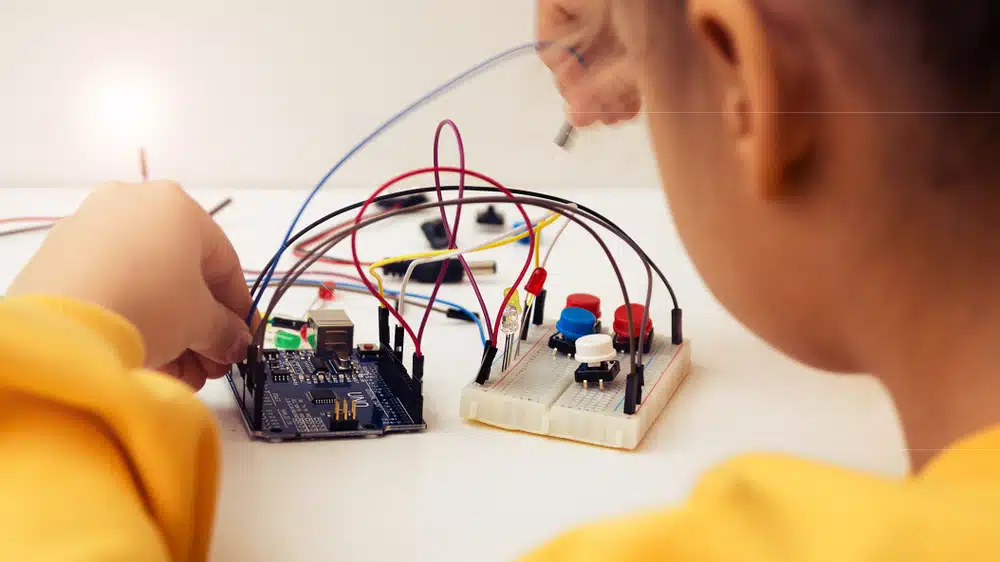31 Crucial Skills Starting with E for Educational Success
Students today struggle not because they lack intelligence, but because they’re missing crucial skills that nobody talks about.
Picture a bright student who can’t seem to get ahead – they might be lacking essential “E” skills that separate average learners from exceptional ones. You’ve probably noticed how some students effortlessly excel while others with similar smarts struggle to keep up.
The difference often comes down to mastering specific Skills that Start with E – from empathy and emotional intelligence to executive functioning and effective study habits.
These aren’t just educational buzzwords; they’re the real game-changers that convert academic performance.
List of Educational Skills that Start with E
1. Empathy

- Definition: Empathy is the ability to understand and share the feelings of others.
- Importance in Education: It fosters a supportive learning environment.
- Application: It encourages collaboration and conflict resolution among students.
Empathy is vital in education as it promotes a positive and inclusive classroom culture.
When students can understand and share each other’s perspectives, they are better equipped to work harmoniously.
Empathetic classrooms foster open communication, where students feel comfortable expressing their thoughts and emotions.
This nurturing environment empowers students to engage more deeply with course material and their peers.
2. Ethics

- Definition: Ethics refers to the understanding and practice of moral principles.
- Importance in Education: It cultivates integrity and honesty.
- Application: It guides decision-making and behavior in academic settings.
Ethics play a crucial role in shaping responsible and conscientious individuals.
In an educational context, ethical training helps students develop a strong moral compass, promoting integrity and honesty in their academic pursuits.
From properly citing sources to respecting intellectual property rights, ethics guide students in ethical choices that uphold academic integrity.
Furthermore, ethical decision-making skills are invaluable in navigating various moral dilemmas that may arise professionally and personally.
3. Engagement
- Definition: Engagement is the active participation in learning activities.
- Importance in Education: It increases retention and understanding.
- Application: It encourages active discussion and hands-on learning.
Engaging students in learning is key to fostering deeper understanding and retention of course material.
Active participation through discussions, hands-on activities, and collaborative projects enhances comprehension.
Engaged learners are more motivated and invested in their education, leading to better academic outcomes.
Engagement promotes critical thinking, problem-solving, and the application of knowledge in practical contexts.
By incorporating engaging pedagogical approaches, educators can create dynamic and immersive learning experiences that captivate students’ interest and maximize their academic potential.
4. Expression

- Definition: Expression is the ability to convey thoughts and feelings effectively.
- Importance in Education: It enhances communication skills.
- Application: It supports presentations and group discussions.
Expressing oneself clearly and confidently is an invaluable skill in educational settings.
Effective expression allows students to articulate their ideas, share their perspectives, and engage in meaningful discourse.
This skill is particularly crucial in class presentations, group discussions, and debates, where students must communicate their thoughts coherently and persuasively.
By honing their expression skills, students develop the confidence to voice their opinions, ask insightful questions, and contribute to a vibrant learning environment.
5. Equity

- Definition: Equity is the promotion of fair treatment and opportunities for all.
- Importance in Education: It ensures equal access to resources.
- Application: It adjusts teaching methods to meet diverse needs.
Equity in education is essential for creating an inclusive and equitable learning environment.
It ensures that all students have equal access to educational resources and opportunities regardless of their background or circumstances.
By promoting equity, educators can address the unique needs and challenges faced by diverse student populations, such as those with disabilities, cultural differences, or socioeconomic disadvantages.
This may involve:
- Adjusting teaching methods.
- Providing additional support.
- Offering alternative learning pathways.
These measures ensure that every student has the chance to succeed.
6. Empowerment

- Definition: Empowerment is encouraging confidence in one’s abilities.
- Importance in Education: It builds student autonomy and motivation.
- Application: It supports self-directed learning and goal setting.
Empowering students is a crucial aspect of education that fosters autonomy, motivation, and self-belief.
When students feel empowered, they develop the confidence to take ownership of their learning journey and set ambitious goals.
Empowerment encourages students to be proactive in their educational pursuits, seeking out resources and opportunities for growth.
By supporting self-directed learning and goal setting, educators can nurture a sense of agency and responsibility in their students, preparing them to become lifelong learners and effective decision-makers.
7. Eloquence

- Definition: Eloquence is persuasive and fluent speaking.
- Importance in Education: It improves public speaking skills.
- Application: It enhances debate and oral presentation skills.
Eloquence, the ability to speak persuasively and fluently, is a valuable skill in educational settings.
It enables students to effectively communicate their ideas, opinions, and arguments clearly and compellingly.
This skill is particularly important in debates, oral presentations, and public speaking events, where students must engage and persuade their audience.
By developing eloquence, students gain confidence in their communication abilities, structure their thoughts coherently, and become more adept at delivering impactful messages.
8. Etiquette

- Definition: Etiquette is observing formal behaviors and rules.
- Importance in Education: It promotes professionalism and respect.
- Application: It teaches proper conduct in various social settings.
Etiquette plays a crucial role in fostering professionalism and respect within educational environments.
It involves adhering to established rules and behaviors that govern various social and academic interactions.
By learning and practicing proper etiquette, students develop an understanding of appropriate conduct in different settings, such as classrooms, presentations, or formal events.
Etiquette promotes respectful interactions among peers and educators and prepares students for future professional environments where proper decorum is expected.
9. Empiricism

- Definition: Empiricism relies on observation or experience.
- Importance in Education: It encourages evidence-based learning.
- Application: It supports scientific inquiry and experimentation.
Empiricism, relying on observation and experience, is fundamental to evidence-based learning in education.
It encourages students to base their understanding and conclusions on tangible, verifiable data rather than mere speculation or assumption.
This approach is particularly valuable in scientific disciplines, where empirical methods such as experimentation and data collection are essential for advancing knowledge.
By embracing empiricism, students develop critical thinking skills, question assumptions, and cultivate a healthy skepticism toward unsubstantiated claims.
10. Endurance

- Definition: Endurance is persevering through challenges.
- Importance in Education: It develops resilience.
- Application: It encourages persistence in solving complex problems.
Endurance, the ability to persevere through challenges, is a critical skill in education that fosters resilience and determination.
In the academic journey, students inevitably encounter obstacles, whether in the form of complex concepts, demanding assignments, or setbacks.
Endurance empowers students to embrace these challenges with a growth mindset, remaining committed to their goals despite difficulties.
This skill encourages persistence in problem-solving as students learn to break down complex tasks, seek support when needed, and persevere until a solution is found.
11. Exploration

- Definition: Exploration is curiosity and willingness to investigate.
- Importance in Education: It stimulates intellectual curiosity.
- Application: It encourages research and discovery learning.
Exploration, driven by curiosity and a willingness to investigate, is a key skill that stimulates intellectual growth in education.
It fosters a curious mindset, prompting students to actively seek new knowledge and insights.
Educators can ignite their students’ passion for learning and discovery by encouraging exploration.
This skill is particularly valuable in research-based disciplines, where students must navigate vast bodies of information and uncover new perspectives or solutions. Exploration also supports discovery learning, where students construct their understanding through hands-on experiences and inquiry.
12. Explanation

- Definition: Explanation is explaining something, giving a reason for something that has happened.
- Importance in Education: Explaining is necessary to cultivate understanding and respect for different educational beliefs and behaviors.
- Application: It explains how particular beliefs or behaviors of different cultures arise.
The ability to provide clear explanations is crucial in educational settings.
Explanations help students grasp complex concepts by breaking them down into understandable components.
They also foster understanding and respect for diverse beliefs and behaviors encountered in multicultural learning environments.
Educators can cultivate an atmosphere of acceptance and open-mindedness by explaining the origins and reasoning behind cultural practices.
13. Elaboration

- Definition: Elaboration is the act or process of explaining or describing something in detail.
- Importveness in Education: It is necessary to understand complex subjects, ideas, theories, or concepts.
- Application: It is used to understand people’s beliefs, motivations, and actions.
Elaboration skills are essential for comprehending intricate subjects, theories, and concepts encountered in academic pursuits.
Educators can facilitate a deeper understanding of complex material by providing detailed explanations and descriptions.
Elaboration also plays a vital role in deciphering the beliefs, motivations, and actions of individuals from diverse backgrounds, promoting empathy and cultural awareness.
14. Evaluation

- Definition: Evaluation is assessing information to form a judgment.
- Importveness in Education: It is critical for analytical thinking.
- Application: It is used in tests, essays, and project assessments.
Evaluating information and forming well-reasoned judgments is a cornerstone of analytical thinking in education.
This skill is indispensable for taking tests, writing essays, and completing project assessments.
By critically evaluating data, students can develop sound arguments, identify strengths and weaknesses, and arrive at informed conclusions essential for academic success.
15. Efficiency
- Definition: Efficiency is maximizing productivity with minimal wasted effort.
- Importveness in Education: It improves time management.
- Application: It is essential in project planning and execution.
Efficiency is a valuable skill that enhances time management and productivity in educational contexts.
Students can optimize their study routines and complete assignments more effectively by maximizing output while minimizing wasted effort.
Efficiency is particularly crucial in project planning and execution, where proper resource allocation and adherence to timelines are essential for successful outcomes.
16. Experimentation

- Definition: Experimentation is trying new methods or ideas.
- Importveness in Education: It encourages innovation and creativity.
- Application: It is key in scientific and creative disciplines.
Experimentation fosters an environment that encourages innovation and creativity in educational settings.
By trying new methods or ideas, students can explore alternative approaches to problem-solving and challenge conventional wisdom.
This skill is particularly valuable in scientific and creative disciplines, where experimentation drives knowledge advancement and the development of novel solutions.
17. Error Correction

- Definition: Error Correction is identifying and correcting mistakes.
- Importveness in Education: It is essential for learning from failures.
- Application: It is integral in editing and revising work.
Identifying and correcting mistakes is an essential aspect of the learning process.
Students can learn from their failures and improve their understanding by recognizing and addressing errors.
Error correction is integral in activities such as editing and revising written work, where identifying and rectifying mistakes is crucial for producing high-quality outputs.
18. Executive Functioning

- Definition: Executive Functioning is managing oneself and resources effectively.
- Importveness in Education: It is crucial for organizational skills.
- Application: It is key in managing assignments and deadlines.
Executive functioning skills are vital for effective self-management and resource allocation in educational contexts. These skills are crucial for developing strong organizational abilities, enabling students to prioritize tasks, manage their time efficiently, and meet deadlines. Proficient executive functioning is key in juggling multiple assignments and responsibilities, ensuring academic success.
19. Editing

- Definition: Editing is improving writing for clarity and accuracy.
- Importveness in Education: It is essential for producing quality written work.
- Application: It is used to revise essays and research papers.
Editing is a fundamental educational skill essential for producing clear, accurate, and high-quality written work.
This skill is particularly important when revising essays, research papers, and other academic assignments.
By editing their work, students can enhance the clarity and coherence of their ideas, correct errors, and ensure that their writing effectively communicates their intended message.
20. Extrapolation

- Definition: Extrapolation is extending known information to new areas.
- Importveness in Education: It enhances problem-solving and predictive abilities.
- Application: It is useful in advanced mathematics and science.
Extrapolation, the ability to extend known information to new areas, is a valuable skill in education.
It enhances problem-solving abilities by allowing students to apply existing knowledge to novel situations and contexts.
This skill is particularly useful in advanced mathematics and science, where extrapolation is often employed to make predictions, develop hypotheses, and explore uncharted territories of knowledge.
21. Economics

- Definition: Economics is understanding economic principles.
- Importveness in Education: It encourages informed decision-making.
- Application: It applies to personal finance and global economic issues.
Understanding economic principles is critical in education, as it encourages informed decision-making.
By studying economics, students gain insights into factors that influence financial decisions, personally and globally.
This knowledge applies to personal finance management and comprehending and analyzing global economic issues and their impacts.
22. Environmental Awareness

- Definition: Environmental Awareness is understanding human impact on nature.
- Importveness in Education: It promotes sustainability.
- Application: It is integrated into science and social studies curricula.
Environmental awareness, the understanding of human impact on the natural world, is essential in education.
Educational institutions can foster environmental awareness, promote sustainable practices, and encourage students to be mindful of their ecological footprint.
This skill is often integrated into science and social space studies curricula, providing opportunities for practical application and fostering an appreciation for the natural world.
23. Ergonomics

- Definition: Ergonomics is designing environments for efficiency and comfort.
- Importveness in Education: It enhances learning environments.
- Application: It is applied in classroom layout and design.
Ergonomics, the practice of designing environments for efficiency and comfort, is crucial in enhancing learning environments.
By applying ergonomic principles to the layout and design of classrooms, educators can create spaces that are conducive to learning, minimize distractions, and promote student well-being.
This skill is essential for optimizing the physical learning environment and fostering an atmosphere that supports academic success.
24. Euphony

- Definition: Euphony is creating pleasing and harmonious sounds.
- Importveness in Education: It enhances auditory learning experiences.
- Application: It is used in music education and speech arts.
Euphony, the creation of pleasing and harmonious sounds, is a valuable skill in educational settings.
It enhances auditory learning experiences by making them more engaging and enjoyable.
This skill is particularly relevant in music education, where euphony is essential for producing beautiful melodies and harmonies.
Additionally, euphony is applied in speech arts, allowing speakers to deliver presentations with a pleasing and captivating vocal quality.
25. Ethical Hacking

- Definition: Ethical hacking is identifying and attempting to exploit system vulnerabilities to evaluate the security posture of an organization’s systems, networks, and applications.
- Importance in Education: Teaching ethical hacking equips students with crucial skills for protecting systems and data, preparing them for cybersecurity and penetration testing careers.
- Application: Ethical hacking techniques are used to conduct security assessments and penetration testing and to identify and mitigate potential vulnerabilities before malicious actors can exploit them.
Ethical hacking has emerged as a vital discipline in cybersecurity. By ethically challenging and attempting to breach systems and networks, skilled professionals can uncover vulnerabilities and potential entry points for cyber threats.
This proactive approach enables organizations to strengthen their defenses and implement robust security measures, safeguarding sensitive data and critical infrastructure from malicious actors.
Educational programs incorporating ethical hacking training provide students with hands-on experience identifying vulnerabilities, conducting penetration testing, and developing effective mitigation strategies.
These skills are invaluable in the ever-changing cybersecurity landscape, preparing students for careers as ethical hackers, penetration testers, or cybersecurity analysts.
26. Entomology

- Definition: Entomology is the study of insects.
- Importveness in Education: It encourages scientific inquiry.
- Application: It is integrated into biology and environmental science studies.
Entomology, the study of insects, is a field that encourages scientific inquiry in educational settings.
By exploring the fascinating world of insects, students can develop critical thinking skills, observe natural phenomena, and engage in hands-on research.
This discipline is often integrated into biology and environmental science curricula, providing opportunities for practical application and fostering an appreciation for the natural world.
27. Epidemiology

- Definition: Epidemiology is the study of diseases in populations.
- Importveness in Education: It promotes public health awareness.
- Application: It is relevant in health education and biology.
Epidemiology, the study of diseases in populations, is an important field that promotes public health awareness in education.
By understanding the patterns and factors influencing disease spread, students can develop a deeper appreciation for preventive measures and the significance of public health initiatives.
This knowledge is relevant in health education and biology courses, equipping students with valuable insights for safeguarding community well-being.
28. Epistemology

- Definition: Epistemology is the study of knowledge and belief.
- Importveness in Education: It enhances philosophical and critical thinking.
- Application: It is explored in philosophy and theory of knowledge courses.
Epistemology, the study of knowledge and belief, is a discipline that enhances philosophical and critical thinking in educational settings.
By exploring the nature of knowledge, its sources, and its limitations, students can better understand how we acquire and validate information.
This field is often explored in philosophy and theory of knowledge courses, fostering intellectual curiosity and equipping students with the tools to navigate complex epistemological questions.
29. Electronics
- Definition: Electronics is the understanding and use of electronic systems.
- Importveness in Education: It prepares students for technology-driven fields.
- Application: It is integral to STEM education and vocational training.
Electronics, the understanding and use of electronic systems, is a crucial skill in education.
As technology continues to permeate various industries, students need to develop proficiency in electronics.
This skill is integral to STEM (Science, Technology, Engineering, and Mathematics) education, equipping students with the knowledge and practical abilities required for technology-driven fields.
Additionally, electronics is a core component of vocational training programs, preparing individuals for careers in fields such as electrical engineering and computer technology.
30. Entrepreneurship

- Definition: Entrepreneurship is initiating and managing business ventures.
- Importveness in Education: It fosters innovation and self-reliance.
- Application: It is incorporated into business studies and economics courses.
Entrepreneurship, the ability to initiate and manage business ventures, is a valuable educational skill.
Educational institutions can promote student innovation, creativity, and self-reliance by fostering entrepreneurial mindsets.
This skill is often incorporated into business studies and economics courses, providing students with the knowledge and tools to identify market opportunities, develop business plans, and navigate the challenges of launching and sustaining successful enterprises.
31. E-Learning

- Definition: E-learning is utilizing digital platforms for education.
- Importveness in Education: It expands access to learning resources.
- Application: It is used in distance education and blended learning environments.
Using digital platforms for education, E-learning is a transformative skill in modern educational landscapes.
By leveraging digital technologies, e-learning expands access to learning resources, making education more accessible and inclusive.
This skill is particularly important in distance education and blended learning environments, where digital platforms facilitate remote learning, collaborative activities, and the dissemination of educational content.
Educational Growth Due to These Skills
Acquiring the essential skills starting with ‘E’ can significantly impact personal and professional development.
These skills empower individuals to:
- Navigate academic challenges
- Foster intellectual growth
- Cultivate a lifelong love for learning
As students integrate these abilities into their educational journeys, they unlock new avenues for success and self-discovery.
One inspiring example is the story of Sarah, a recent graduate who excelled in her studies by harnessing skills such as:
- Engagement
- Elaboration
- Experimentation
Sarah developed a deeper understanding of course material through active participation in class discussions and hands-on projects.
Her ability to expand on ideas with rich details and experiment with innovative approaches allowed her to tackle complex problems creatively.
Sarah’s educational success is a testament to the transformative power of these skills.
Moreover, educational institutions worldwide acknowledge the importance of nurturing these capabilities in students. Trends in education highlight a shift towards:
- Experiential learning
- Critical thinking
- Real-world problem-solving
By emphasizing empiricism, environmental awareness, and entrepreneurship, educators prepare students to become well-rounded, socially responsible individuals equipped to thrive in a rapidly changing world.
Skill Application in Workplace Dynamics
The 31 essential skills starting with ‘E’ are not limited to academic settings; they also play a pivotal role in workplace dynamics.
Professionals who possess and apply these skills can significantly enhance productivity, foster a harmonious work environment, and contribute to team success.
- Effective communication is paramount in everyday work scenarios.
- Skills like eloquence and expression enable employees to articulate their ideas clearly and persuasively, facilitating collaboration and understanding within teams.
- Additionally, skills such as empathy and ethics promote respectful interactions, fostering an inclusive and trustworthy workplace culture.
- To demonstrate these skills and enhance workplace harmony, employees can adopt strategies such as actively listening to colleagues, practicing emotional intelligence, and adhering to ethical principles in decision-making.
- By fostering a spirit of exploration and embracing constructive feedback through error correction, individuals can continually improve and contribute to a positive work environment.
Furthermore, these skills are invaluable for team building and project management.
Skills like efficiency, executive functioning, and evaluation enable teams to prioritize tasks, allocate resources effectively, and make informed decisions.
Collaborative skills such as engagement and elaboration facilitate productive brainstorming sessions and ensure all voices are heard, ultimately leading to more innovative and cohesive solutions.
Advancement in Career Through Skills Enhancement
Continuous learning and upgrading the essential Skills that Start with E , can lead to significant career advancement.
In today’s dynamic job market, individuals who consistently invest in skill development position themselves as valuable assets, capable of adapting to evolving industry demands and taking on leadership roles.
Leadership roles and high-level positions often require a comprehensive skill set encompassing strategic thinking, effective communication, and decision-making prowess.
- Skills such as entrepreneurship, economics, and environmental awareness equip individuals with a broad perspective, enabling them to navigate complex challenges and drive sustainable organizational growth.
- Professionals can leverage various resources to identify and pursue skill development opportunities.
- Attending workshops, participating in online courses, or seeking mentorship from experienced professionals can provide valuable guidance.
- Additionally, actively seeking feedback from colleagues and embracing constructive criticism can uncover areas for improvement and inform personalized development plans.
Employers increasingly recognize the value of investing in employee skill development.
By offering training programs, encouraging participation in professional development activities, and fostering a culture of continuous learning, organizations can retain top talent and foster a workforce that is adaptable, innovative, and well-equipped to tackle future challenges.
Technological Integration and Skill Development
Technology is pivotal in developing and honing the 31 essential skills, starting with ‘E.’
Advancements in digital tools and platforms have revolutionized how individuals acquire, practice, and refine these abilities, creating new opportunities for personalized and immersive learning experiences.
- One notable example is the integration of e-learning platforms in education.
- These digital environments facilitate engagement, allowing students to participate in interactive lessons, collaborate with peers, and receive immediate feedback.
- Additionally, online simulations and virtual reality applications enable hands-on experimentation and skill development in electronics, ergonomics, and entrepreneurship.
- Looking ahead, emerging technologies such as artificial intelligence (AI) and augmented reality (AR) are poised to shape the future of skill development.
- AI-powered adaptive learning systems can personalize the learning experience by analyzing individual strengths and weaknesses and providing tailored content and exercises to enhance specific skills.
- On the other hand, AR applications can create immersive environments for practicing skills like empathy, expression, and etiquette in simulated real-world scenarios.
In the medical field, for instance, virtual reality simulations allow healthcare professionals to practice critical skills like emergency response and surgical techniques in a safe, controlled environment.
Similarly, in the manufacturing industry, augmented reality applications train employees on complex machinery operation and maintenance, enhancing skills like efficiency and error correction.
Conclusion
The essential Skills that Start with E represent a comprehensive and invaluable set of skills for personal growth, academic success, and professional advancement.
From empathy and engagement to entrepreneurship and e-learning, these abilities equip individuals with the tools necessary to navigate the complexities of modern life and contribute positively to society.
As the world evolves rapidly, embracing continuous learning and actively pursuing skill development becomes paramount.
By cultivating these skills, individuals can unlock their full potential, adapt to changing environments, and thrive in an increasingly interconnected and technology-driven world.










